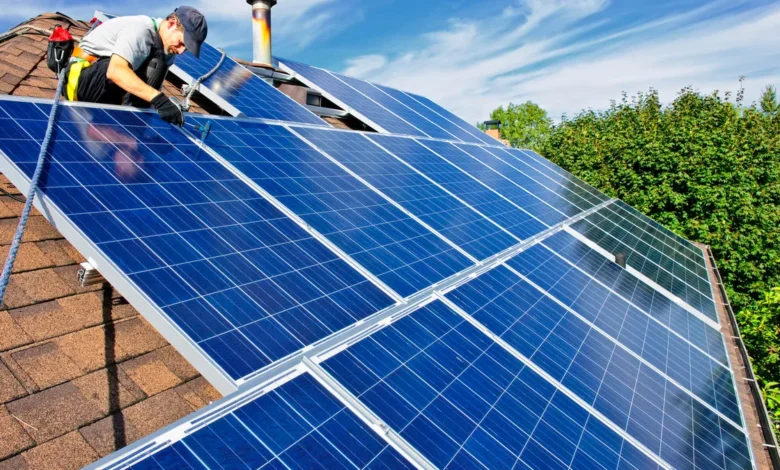How to Pick a Solar Installer: 10 Tips

Introduction
In today’s environmentally conscious world, more and more homeowners are turning to solar energy as a sustainable and costeffective alternative to traditional power sources. However, choosing the right solar installer is crucial to ensure the successful installation and longterm performance of your solar panels. With numerous options available, it can be challenging to determine the best fit for your needs. This article will provide you with 10 essential tips on how to pick a solar installer, empowering you to make an informed decision for a greener future.
Tip # 1. Research Credentials and Certifications
How to Pick a Solar Installer? Start your solar installer selection process by researching the credentials and certifications of potential companies. A reputable solar installer should be certified by relevant industry bodies, such as the North American Board of Certified Energy Practitioners (NABCEP). These certifications demonstrate that the installer has met specific standards and possesses the necessary expertise to handle solar installations professionally.
Tip # 2. Check References and Reviews
One of the most effective ways to gauge the reliability and quality of a solar installer is by checking references and online reviews. Reach out to past clients to inquire about their experiences with the installer. Additionally, browse online platforms to read reviews and testimonials. A trustworthy solar installer should have a positive track record of customer satisfaction and successful installations.
key points to enhance your understanding:
1. Understanding the Scope of Projects: Reviews and references can provide insight into the types of projects the solar installer has previously undertaken. This includes residential, commercial, or industrial installations, giving you a clearer picture of their expertise and whether it aligns with your specific solar project needs. Identifying installers with experience in projects similar to yours can significantly impact the success and efficiency of your solar energy system.
2. Assessing Customer Service Quality: Through engaging with past clients and reading detailed reviews, you can assess the installer’s level of customer service. This encompasses their responsiveness, ability to communicate effectively, and willingness to address concerns or issues promptly. Excellent customer service is crucial, especially if you encounter any problems or need maintenance after the installation is complete.
3. Identifying Consistent Performance: Look for patterns in the feedback provided by past clients. Consistency in delivering quality installations, meeting deadlines, and staying within budget reflects an installer’s reliability and professionalism. Repeated positive feedback on specific aspects of the installer’s service can be a strong indicator of their strengths, while recurrent negative comments may highlight areas of concern.
4. Gauging PostInstallation Support: Reviews can also shed light on the installer’s commitment to postinstallation support, including warranty claims, system monitoring, and maintenance services. An installer that actively supports clients after the installation reflects a longterm commitment to customer satisfaction and the performance of their solar systems.
5. Leveraging Social Proof: Positive reviews and strong references serve as social proof, reassuring potential clients of the installer’s credibility and quality of work. In today’s digital age, social proof can significantly influence decisionmaking processes. However, it’s essential to approach this information critically, recognizing that while reviews can be highly informative, they should be one of many factors considered in your decisionmaking process.
Tip # 3. Evaluate Experience and Track Record
Experience matters when it comes to solar installations. Look for a solar installer with a proven track record of completing successful projects. An experienced installer will have encountered and overcome various challenges, ensuring a smoother installation process for your solar panels.
Tip # 4. Assess Warranty and AfterSales Support
A reliable solar installer should provide a comprehensive warranty on both the equipment and the installation itself. Be sure to understand the terms and duration of the warranty offered. Additionally, inquire about the availability of aftersales support, as this is crucial for addressing any issues that may arise after the installation is complete.
Tip # 5. Compare Pricing and Financing Options
While cost should not be the sole determining factor, it is essential to compare pricing among different solar installers. Obtain quotes from multiple companies and carefully evaluate the value they offer for the price. Additionally, inquire about financing options, as many reputable installers provide flexible payment plans or partnerships with financing institutions to make solar installations more accessible.
Tip # 6. Investigate Solar Panel Quality
The quality of the solar panels used by an installer significantly impacts the overall performance and longevity of your solar energy system. Inquire about the types of panels offered, their efficiency ratings, and any additional features. A reliable solar installer will prioritize highquality, durable panels that maximize energy production.
Tip # 7. Check Licensing and Insurance
Ensure that the solar installer you choose is licensed and insured. A valid license indicates that the installer complies with local regulations and possesses the necessary skills for the job. Insurance is crucial for protecting both you and the installer in the event of any accidents or damages during the installation process.
- Valid License Equals Compliance: A licensed installer meets local regulations and standards, ensuring a professional and compliant installation.
- Protection Through Insurance: Installer insurance covers accidents and damages, protecting both homeowner and installer financially.
- Worker’s Compensation: Ensures you’re not liable for onsite injuries, highlighting the installer’s commitment to safety.
- Safety Standards Adherence: Licensed and insured installers are more likely to follow industry safety protocols, reducing risks.
- Legal and Financial Security: Licensing and insurance provide a safety net against disputes and unforeseen costs, offering peace of mind.
Tip # 8. Assess Customization and Design Capabilities
Every home is unique, and a onesizefitsall approach may not be suitable for solar installations. Choose a solar installer with the capability to customize the design of your solar energy system based on your specific needs and the layout of your property. This ensures optimal energy production and aesthetic integration with your home.
Tip # 9. Inquire About Monitoring and Maintenance
A reputable solar installer should offer monitoring services to track the performance of your solar panels continuously. Additionally, inquire about their maintenance services to ensure the longevity and efficiency of your solar energy system. Regular maintenance can detect and address issues early, preventing potential problems and maximizing the lifespan of your investment.
Tip # 10. Verify Local Knowledge and Permits
Solar installation requirements vary by location, so it’s crucial to choose a solar installer with local knowledge and experience. They should be wellversed in local regulations, zoning laws, and permit requirements. An installer with local expertise will streamline the permitting process, ensuring a faster and smoother installation.
Conclusion
Choosing the right solar installer is a critical step towards harnessing the power of solar energy for your home. By following these 10 tips, you can make an informed decision that aligns with your energy goals, budget, and environmental values. Remember to prioritize credentials, experience, and customer satisfaction when selecting a solar installer for a greener and more sustainable future.
FAQS
1. How can I verify the credentials of a solar installer?
Ans: Start by researching the certifications of potential companies, ensuring they are certified by industry bodies like NABCEP.
2. Why is checking references and reviews important when selecting a solar installer?
Ans: References and reviews provide insights into the installer’s project scope, customer service, consistency, postinstallation support, and serve as social proof of their credibility.
3. What factors should I consider when evaluating the experience and track record of a solar installer?
Ans: Look for a proven track record of successful projects, as experience ensures the installer can handle challenges, leading to a smoother installation process.
4. Why is it crucial to assess warranty and aftersales support when choosing a solar installer?
Ans: Comprehensive warranties and aftersales support are essential for addressing issues postinstallation and ensuring the longevity of your solar energy system.
5. How can I ensure the solar installer I choose is compliant with local regulations and safety standards?
Ans: Verify that the installer is licensed and insured, indicating compliance with local regulations and a commitment to safety. Additionally, checking for worker’s compensation ensures liability protection.





One Comment